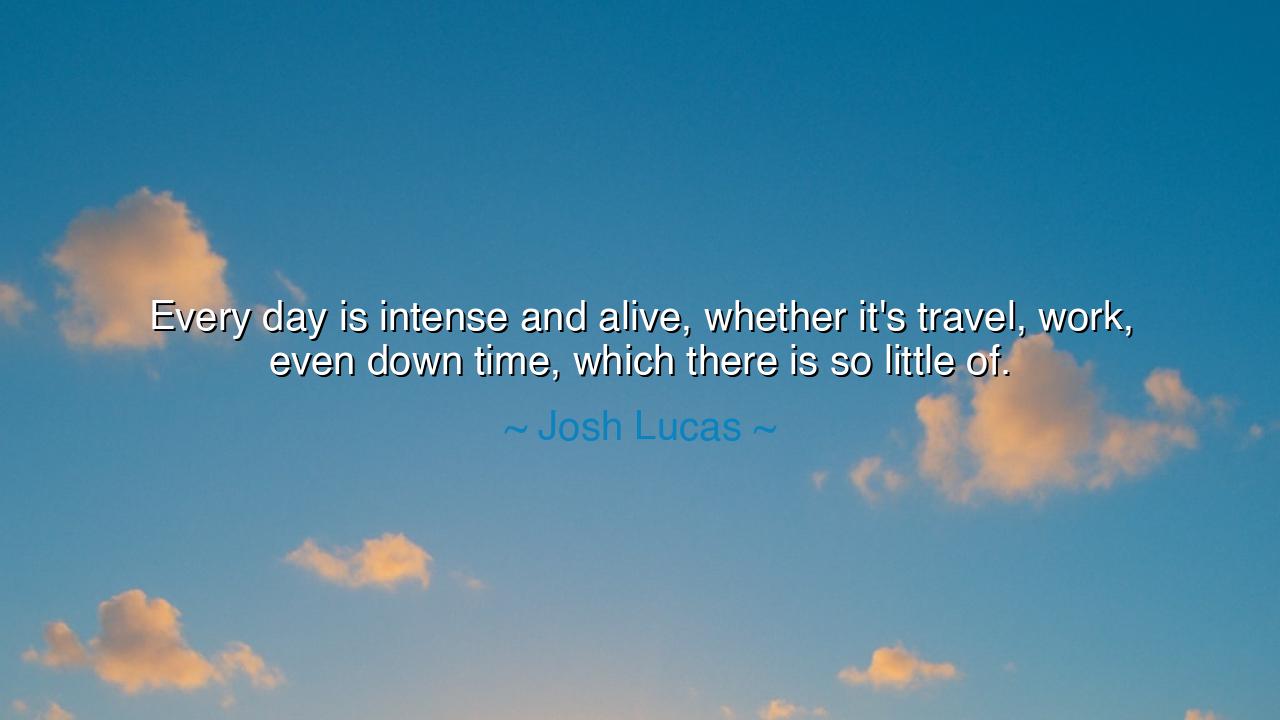
Every day is intense and alive, whether it's travel, work, even
Every day is intense and alive, whether it's travel, work, even down time, which there is so little of.






In the words of Josh Lucas, we are reminded of the fierce rhythm of existence: “Every day is intense and alive, whether it’s travel, work, even down time, which there is so little of.” At first, these words may seem like the musings of a man overwhelmed by the demands of life. Yet if we listen deeply, we hear something greater: a hymn to the fullness of living, to the truth that even weariness can pulse with vitality when the spirit embraces each moment as sacred.
To declare that every day is intense is to acknowledge that life itself is no small matter. Each sunrise brings both burden and blessing, trial and triumph, and none should be taken lightly. In the ancient stories, the warrior did not complain of the battlefield, for he knew that each clash of sword and shield was a sign he was alive. So too Lucas reminds us that the very weight of our days, whether in work, travel, or fleeting rest, is proof of life’s richness, not its emptiness.
The word alive carries within it a great fire. To be alive is not merely to breathe, but to burn with awareness. It is to feel the press of duty, the thrill of the journey, the ache of exhaustion, and even the rare sweetness of silence. The sages of old taught that a man should not count his years, but his moments of aliveness. For a long life lived in dullness is poorer than a short one lived with intensity. Lucas’ words remind us to see vitality even where we are tempted to see only stress.
Travel and work are named as equal in this rhythm. Travel brings the mind new horizons, and work, though wearying, forges strength and purpose. Both are teachers. The great general Alexander, though conquering nations, found as much intensity in the march as in the battle. The road, the planning, the strain—these too were alive with meaning. Likewise, our own labor and journeys, though routine, are not void of worth if we choose to see them as part of the grand adventure of living.
Even down time, he says, is scarce, yet alive. Here lies wisdom: rest does not have to be abundant to be precious. The monk who sits in silence for a single hour can find in it the same depth as a king in his golden leisure. In truth, the rarity of rest makes it more sacred. The ancients understood this well, pausing between wars and harvests to celebrate feasts, to give thanks, to remember that stillness is not absence of life but its refinement.
Consider the life of Marcus Aurelius, emperor and philosopher. His days were consumed with wars, councils, and duties that would overwhelm lesser men. Yet in his private writings, he reflected on the intensity of every moment—how even the struggles of governance were opportunities to practice wisdom and strength. His “down time” was a candlelit hour of thought, scarce yet profound. Like Lucas, Marcus saw that life’s fullness lies not in the abundance of rest but in the intensity with which one lives each instant.
The lesson is clear: embrace the intensity of your days. Do not scorn the busyness, nor curse the scarcity of rest, but recognize that in the press of duty, the rush of travel, and the rarity of stillness, life reveals its richness. Each moment, even the weary one, is a note in the great song of existence, and to be alive is to hear it, to feel it, to honor it.
So I say to you: live your days as though each were a battlefield and a blessing. When you work, pour yourself into it. When you travel, let your eyes drink in the world. When you find down time, even if brief, let it be sacred. For every day, as Lucas reminds us, is not ordinary, but intense and alive, a fire that burns only once before fading into memory. Live it well.






AAdministratorAdministrator
Welcome, honored guests. Please leave a comment, we will respond soon